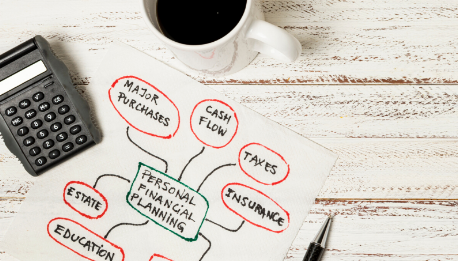Spring in Melbourne is a strange time. Beautiful sun-filled days are often rudely interrupted by arctic blasts of torrential rain. Yet, as the scent of blossom teases us with the promise of summer, we find ourselves in the throes of spring cleaning our homes, weeding our gardens and cleaning the barbeque ready for the new year ahead. But have you considered spring clean your finances?
It’s well worth the effort, especially on a rainy day!
10 Steps to a Fresh Start with Squeaky Clean Finances
Clean out your financial cupboard
It’s a crucial first step but, be warned, the length of time it takes will depend on your level of organisation. Literally clear out your desk, handbag, wallet or purse and put all your financial paperwork – bills, receipts, pay slips, tax and insurance documents – into separate piles, ready for you to sort through.
Tidy up receipts and bills
Start with your receipts and bills. Organise your bills into paid/unpaid and work out what needs to be actioned/kept. Don’t throw anything out until you have:
o Checked any credit card charges and bank account debits have been processed correctly
o Filed receipts and warranties for larger purchases. There are plenty of receipt-apps you can use to store the information rather than keeping all your receipts in a shoebox, drawer or filing cabinet.
o Read this handy resource -‘How Long To Keep Documents and What to Shred’ www.thespruce.com/how-long-to-keep-documents-2648494 - to see how long you need to hold onto important paperwork.
Dispose of your old paperwork
There are a couple of ways to do this. Remember that it’s important to protect yourself against identity theft so don’t just chuck bills and receipts in the bin. Personal shredders are inexpensive, but it does take time to use them. Alternatively, contact a company like www.shredit.com.au for safe and secure disposal of important documents.
Before you shred, scan important receipts, bills and other financial paperwork so you have easily accessible copies stored digitally. Don’t forget to back up your files!
Create a digital filing wardrobe
Set up computer filing system to keep track of your finances. Start with one folder and build out subcategories from there so all your information is well-managed and accessible when it comes to doing your tax. It’s well worth the time spent organising this – and if you keep it up to date, it will save you time and stress down the track.
Safely stash your important paperwork
Store your important documentation in a safe place:
o Academic records
o Adoption papers
o Baptismal certificates
o Birth certificates
o Death certificates:
o Driver's licenses
o Employment records
o Marriage Certificates
o Medical records
o Military records
o Passports
o Retirement and pension records
o Social Security information
o Wills
Make sure you tell someone trustworthy where this information is kept, in case you are injured or incapacitated and they need to be retrieved.
Reorganise your bills schedule
Bills can be sneaky things that blindside you when you are least prepared. So, take control. Make a list of your recurring bills and schedule them for payment so you can keep track of your expenses and create a workable budget.
Audit your net worth
Conduct a stocktake of your financial position so you know exactly where you stand. Simply take your assets and subtract your liabilities. It’s worth doing some research into the many apps that can help you keep track of your financial situation to see which one will work for you. They can also help you see how your behaviours and purchases affect your overall financial position, and aid you in making decisions regarding larger purchases or debts.
Shop for a new look
Research current utility, mortgage, credit card and saving account rates, and shop around for insurance quotes to make sure you are not spending too much on your premiums or repayments. It’s good to be aware of your options, rather than staying with the same providers through habit.
Refresh your budget
You know your net worth. You know your income and expenses. So it’s time to give your budget an overhaul. Be realistic in your planning and create achievable goals for your debt repayment and saving plans.
Create a new plan
Speaking of savings – now is the perfect moment to set your financial goals for the next 12 months. What do you want to do? Buy a new car, take a holiday, invest, or save for another major purchase down the track. Defining your goals will keep you focussed and on-track with your budget and expenses. Plus, it’s good for the soul to have something to look forward to!
Spring cleaning your finances brings many positive rewards! Once you have everything under control, it’s important to use your filing and tracking systems to stay on top of your financial information. Not only will this help de-clutter in a physical sense, it also lets you know your position so you are in the perfect place to make smart, effective financial decisions throughout the year ahead.
If you would like to improve your relationship with money and plan for your future, please contact TruWealth on 03 8648 6534 or email contact@truwealthadvice.com.au
General Advice Warning: The information in this communication is provided for information purposes and is of a general nature only. It is not intended to be and does not constitute financial advice or any other advice. Further, the information is not based on your personal objectives, financial situation or needs. You are encouraged to consult a financial planner before making any decision as to how appropriate this information is to your objectives, financial situation and needs. Also, before making a decision, you should consider the relevant Product Disclosure Statement available from your financial planner.

